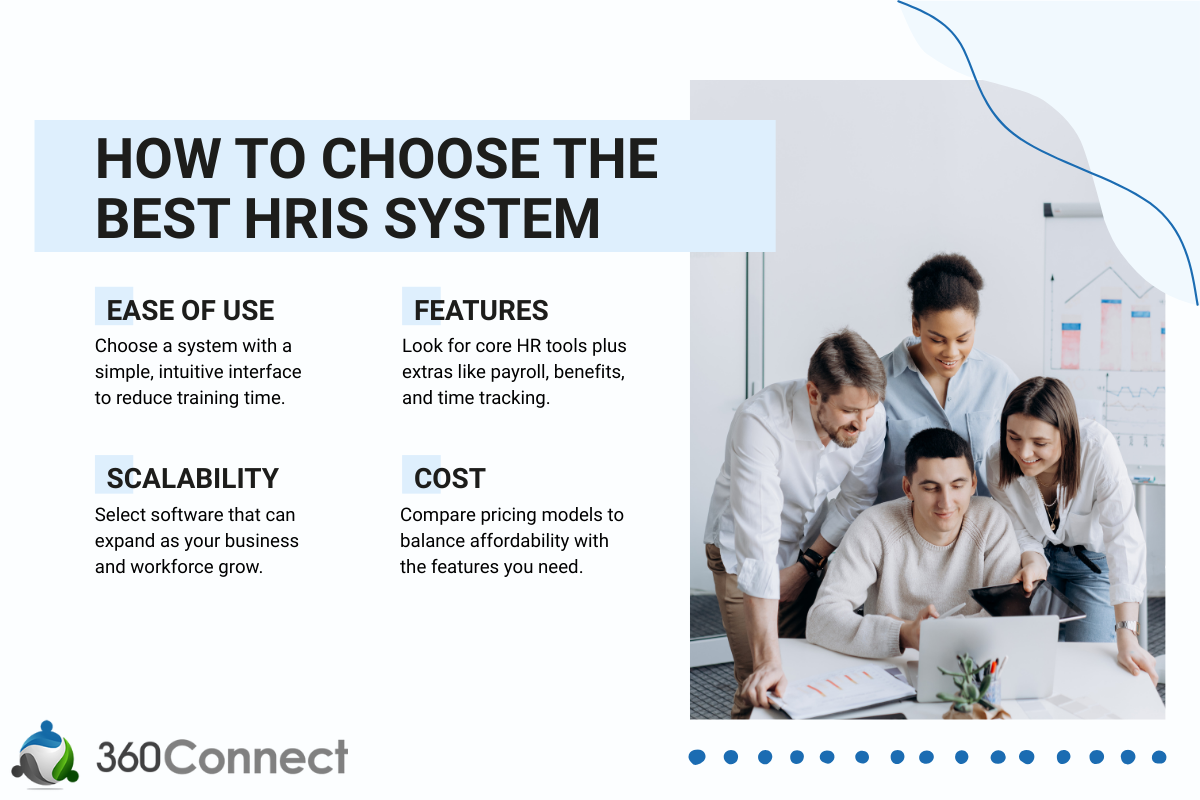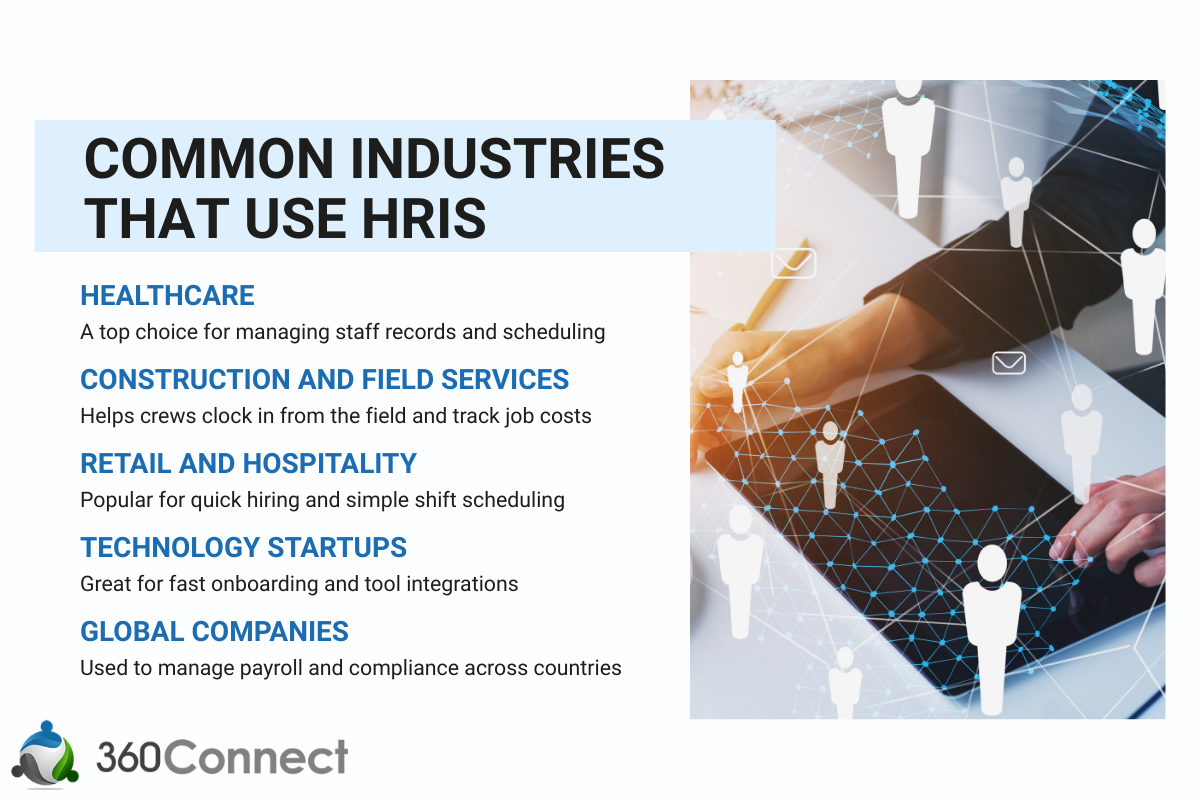Managing HR has never been more complex. Between payroll, compliance requirements, and keeping employees engaged, HR teams today have a lot on their plates. Research shows that 73%–80% of U.S. companies already use an HRIS system to handle these challenges. If you’re not yet using one, you may already be behind. HRIS software helps simplify the workload by putting everything in one place, from onboarding and benefits to reporting and compliance. Choosing the right platform can make a major difference in efficiency and accuracy.
An HRIS is software designed to centralize and streamline HR operations. It helps businesses cut down on errors, stay compliant with labor laws, and improve the overall employee experience. But with so many options available, how do you know which one is right for your company?
In this guide, we’ll break down what HRIS means, what to look for in a provider, the best HRIS systems in 2026, how different industries are using them, and common questions buyers ask. By the end, you’ll have the confidence to choose the right system and take the next step.
Related: 10 Benefits of HRIS for Your Business
What is an HRIS?
HRIS stands for Human Resource Information System. In simple terms, it’s software that brings all of your HR tasks into one place. Instead of switching between spreadsheets, payroll programs, and benefits portals, an HRIS organizes everything in a single system. This makes it easier to stay compliant, cut down on errors, and give employees a smoother experience.
Most HRIS systems include:
- Employee database and records
- Payroll and tax filing
- Benefits administration
- Recruiting and onboarding tools
- Time and attendance tracking
- Performance management
- Compliance and reporting features
In short, HRIS platforms act as the backbone of modern HR. They reduce manual work, make compliance easier, and give both employees and managers tools to manage information more efficiently.
How to Choose the Best HRIS System
Choosing an HRIS is not one-size-fits-all. What works for a 20-person startup will not fit the needs of a 500-person retail chain or a global corporation. Here are the main factors to consider:

Ease of Use
HR systems need to be intuitive. If HR managers and employees cannot quickly learn the platform, adoption will be slow, and frustration will rise. Look for clean, simple dashboards and self-service portals.
Scalability
Some HRIS systems are designed for small businesses, while others are built for large enterprises. Consider your current size and where you plan to be in five years. The best choice is a system that grows with you.
Features
Make a list of must-have features. Do you need advanced recruiting tools? Do you require performance management? Some companies prioritize compliance reporting while others focus on employee engagement.
Integrations
An HRIS should connect with your accounting system, IT tools, or recruiting platforms. If your business relies on integrations, make sure the system has an open API or a marketplace of third-party apps.
Cost
Most HRIS systems charge per employee per month, often with additional setup fees. Consider not only the monthly subscription but also training and support costs. The cheapest option is not always the most valuable if it lacks critical features.
Best HRIS Systems: Decision Making Stats
- The average company spends 16 weeks choosing its HRIS.
- For firms of all sizes, deploying HRIS was primarily driven by the need to acquire more functionality
- HRIS software must include payroll capabilities for 30% of companies to consider purchasing it
Sources: shortlister, Matchr
Top 12 Best HRIS Systems in 2026
Below are twelve of the best HRIS systems available today. Each has its strengths, and the right one for you depends on your company’s size, industry, and goals.
Please note: HRIS vendors rarely list exact prices upfront. Most use per-employee per-month pricing with add-on fees for advanced features. These numbers are based on third-party research and customer reports, but your actual quote may look different depending on your company size and selected modules. (Pricing data current as of September 26, 2025.)
1. Rippling
Best For: Mid-sized and growing companies that need automation and IT management alongside HR
- Why it Stands Out: Combines HR, payroll, and IT in one system, automating onboarding and compliance
- Key Features: Automated workflows, compliance support, IT device and app management, 500+ integrations
- Price: Rippling doesn’t publish clear pricing on its site. Most sources indicate that the base fee starts around $40–50 per month, plus an additional $8 per user per month. The final cost is modular and quote-based, so you’ll pay more if you add services like global payroll, contractor management, or IT device management.
Rippling has quickly become one of the most popular HRIS systems because it combines HR, payroll, and even IT into one unified platform. You can onboard a new hire in minutes by adding them to payroll, enrolling them in benefits, and even sending them a company laptop, all within the same system.
Key strengths include automation and integration. Rippling connects with hundreds of third-party apps, making it easy to fit into your existing workflow. Compliance support is also built in, so tax updates and labor law changes are handled automatically.
The downside is cost. Rippling is on the higher end of the price spectrum, which may not suit very small companies. But for mid-sized businesses looking for a system that can scale, Rippling’s automation makes it one of the most efficient HRIS solutions on the market.
Sources: Business.com, Rippling
2. BambooHR
Best For: Small to mid-sized businesses moving off spreadsheets
- Why it Stands Out: Clean design, short learning curve, strong applicant tracking and performance tools
- Key Features: Employee database, PTO tracking, applicant tracking, performance reviews, reporting
- Price: BambooHR doesn’t list pricing upfront. Reports show it starts around $250 per month for small teams, and larger companies are often quoted about $8–10 per employee per month. Payroll is extra and usually adds another base fee plus a per-employee charge.
BambooHR has become a top pick for companies ready to move away from spreadsheets. Its clean design makes it easy for managers and employees to get up to speed quickly. Beyond storing employee data and managing PTO, BambooHR includes an applicant tracking system (ATS) to simplify hiring, as well as performance review tools that help managers run consistent check-ins.
For smaller companies that may not have a large HR team, BambooHR reduces the manual work of tracking employees and provides professional-grade reports that help leadership make informed decisions. It may not support global payroll, but for small and mid-sized teams, it’s a straightforward and affordable HRIS solution.
Sources: BambooHR, PeopleManagingPeople, Forbes
3. Gusto
Best For: Small businesses needing payroll with simple HR tools
- Why it Stands Out: Easy payroll and tax automation with employee self-service
- Key Features: Payroll, benefits, onboarding, compliance reminders, employee portal
- Price: Starts at $49/month base fee + $6 per employee per month; contractor-only plans start at $35/month + $6 per contractor.
Gusto is popular with small business owners who need payroll taken care of without extra complexity. It automates paycheck calculations, tax filings, and year-end forms. Employees benefit from a self-service portal where they can access pay stubs, update details, or enroll in benefits without needing to contact HR.
Gusto also includes a benefits marketplace where companies can offer health insurance, retirement plans, and commuter perks. While larger organizations may outgrow its feature set, Gusto is a strong fit for small businesses looking for affordable payroll and HR in one place.
Sources: Gusto
4. Paycor
Best For: Mid-sized businesses that need robust recruiting and analytics
- Why it Stands Out: Offers deep reporting and industry-specific tools like job costing
- Key Features: Recruiting, onboarding, payroll, performance management, learning management, analytics
- Price: Typically ranges between $19 and $27 PEPM, depending on modules selected and company size, according to reports.
Paycor is a full-suite HRIS that manages the entire employee lifecycle. It includes recruiting, onboarding, payroll, time tracking, performance management, and learning tools.
What sets Paycor apart is its strong analytics. HR teams can track metrics like turnover rates, labor costs, and compliance risks with ease. It also has industry-specific features, such as job costing for construction companies or scheduling tools for healthcare.
Paycor can be more complex to implement than some smaller HRIS systems, but for mid-sized organizations that need depth across multiple HR functions, it is a powerful option.
Sources: SoftwareConnect, SelectHub, Outsail
5. Zenefits (TriNet Zenefits)
Best For: Small and mid-sized companies focused on benefits administration
- Why it Stands Out: Simplifies benefits, compliance, and open enrollment
- Key Features: Benefits, payroll, time tracking, onboarding, compliance automation, mobile access
- Price: Starts at $10 per employee per month for the Essentials plan; Growth and Zen tiers add more features at higher rates according to reports.
Zenefits is known for simplifying one of the hardest HR tasks: benefits. The system automates open enrollment, keeps up with ACA and COBRA compliance, and allows employees to compare and choose benefits online.
The mobile-first design means workers can update their information or request time off directly from their phones. In addition to benefits, Zenefits offers payroll, onboarding, and time tracking. While it may not offer as many advanced features as enterprise-level systems, Zenefits is a great choice for small and mid-sized businesses that want to reduce benefits headaches and stay compliant.
Sources: Zenefits, Forbes Advisor
6. ADP Workforce Now
Best For: Mid-sized to large companies that need reliable payroll and compliance
- Why it Stands Out: Long-standing leader in payroll accuracy and compliance support
- Key Features: Payroll, benefits, time tracking, recruiting, compliance, reporting
- Price: Commonly estimated at around $19 to $28 PEPM, though ADP requires custom quotes. (based on third-party sources)
ADP is one of the most recognized names in HR software. Workforce Now is its HRIS designed for mid-sized companies. Its biggest strength is payroll accuracy across multiple states and countries.
ADP Workforce Now also includes benefits, recruiting, compliance support, and hundreds of reporting options. Businesses trust ADP for its reliability and ability to stay up to date with tax laws and labor regulations.
The tradeoff is that ADP’s interface is not as modern or intuitive as newer players, and its pricing is often higher. However, for companies that value reliability and compliance above all else, ADP remains a strong choice.
Sources: Outsail, SelectHub
7. UKG Pro
Best For: Large companies with shift-based or hourly workers
- Why it Stands Out: Combines HR functions with advanced workforce scheduling
- Key Features: Payroll, benefits, recruiting, scheduling, time tracking, analytics
- Price: Typically falls between $20 and $37 PEPM, depending on company size and configuration, according to reports.
UKG Pro is a strong choice for companies with large hourly workforces, such as healthcare, retail, and manufacturing. Its scheduling and time tracking tools help managers build efficient rosters while staying compliant with labor rules.
UKG has also invested heavily in AI-driven insights. HR teams can use predictive analytics to identify turnover risks or anticipate staffing shortages before they happen. This makes it more than just a payroll and scheduling system. It becomes a workforce planning tool. While the setup can be complex, for enterprises with thousands of employees, UKG Pro delivers deep functionality.
Sources: Outsail, SoftwareConnect
8. Workday
Best For: Global enterprises and large organizations
- Why it Stands Out: Enterprise-grade HR and finance in one cloud platform
- Key Features: Global payroll, recruiting, performance, learning, analytics, finance integration
- Price: High-end enterprise system, often $45 to $62 PEPM; exact pricing varies by modules and region. (based on third-party sources)
Workday is often the top choice for enterprises. It combines HR and finance in a single cloud-based platform, with features that include global payroll, recruiting, learning, compensation, and advanced analytics.
Workday is designed for large organizations that need deep functionality and strategic insights. Its real-time reporting and dashboards give executives a clear view of workforce trends across multiple countries.
The tradeoff is cost and complexity. Workday is one of the most expensive HRIS systems and requires a significant implementation process. For global enterprises with the budget, it remains the gold standard.
Sources: SoftwareConnect, BetterBuys
9. Paylocity
Best For: Mid-sized companies that want to combine HR with employee engagement
- Why it Stands Out: Adds recognition and social tools to a full HRIS suite
- Key Features: Payroll, benefits, recruiting, performance, peer recognition, social feed
- Price: Generally $22 to $32 PEPM, with modular options available. (based on third-party sources)
Paylocity blends standard HRIS functions with tools designed to boost company culture. Its social-style feed and peer recognition features let employees congratulate each other, share updates, and engage in ways that go beyond payroll or compliance.
This makes Paylocity attractive to companies that want to keep employees connected, especially as more businesses balance hybrid and remote teams. In addition to engagement, Paylocity offers flexible payroll configurations, time tracking, and performance management. It can take time to set up, but once running, it offers mid-sized businesses a strong mix of HR functionality and culture-building.
Sources: OutSail, eLearning Industry
10. Paycom
Best For: Companies prioritizing payroll accuracy and compliance
- Why it Stands Out: Let’s employees verify their own payroll data before processing
- Key Features: Payroll, compliance, recruiting, performance management
- Price: Usually falls between $25 and $36 PEPM, with additional one-time implementation fees. (based on third-party sources)
Paycom sets itself apart with its employee-driven payroll model. Instead of HR shouldering all the responsibility, employees can log in, review their hours, and verify pay before payroll is finalized. This reduces errors, prevents re-runs, and saves HR time.
The platform also supports recruiting, compliance reporting, and performance tools. While it doesn’t integrate with as many outside apps as some competitors, companies that care most about error-free payroll and compliance find Paycom to be a reliable choice.
Sources: Outsail, SelectHub, SoftwareFinder
11. Namely
Best For: Mid-sized businesses seeking a customizable HRIS
- Why it Stands Out: Combines HR workflows with social features for employees
- Key Features: Payroll, benefits, performance, customizable workflows, reporting
- Price: Starts at $9 per employee per month for the Namely Now plan; higher tiers require custom quotes.
Namely is designed for mid-sized companies that want flexibility. HR teams can build custom workflows for things like approvals, onboarding, or time-off requests, making it easier to align the system with company culture.
It also offers solid reporting tools so managers can analyze turnover, hiring trends, and engagement metrics. On the employee side, Namely’s social feed keeps staff updated on company news and recognition. For mid-market organizations, Namely strikes a balance between structure and adaptability.
Sources: Namely
12. HiBob
Best For: Global, fast-growing companies that want culture-focused HR software
- Why it Stands Out: Emphasizes employee engagement and global compliance
- Key Features: Global payroll, surveys, performance, dashboards, recognition tools
- Price: Generally custom quoted between $16 and $22 PEPM, depending on company size and country coverage. (based on third-party sources)
HiBob has quickly gained traction with younger companies that want more than just payroll and compliance. Its survey tools, customizable dashboards, and recognition features help HR teams track engagement and build culture.
At the same time, it supports global operations with multi-country payroll, compliance management, and localization options for different regions. This mix makes HiBob attractive to startups and scale-ups with distributed workforces that want to stay compliant while building strong employee connections.
Sources: SoftwareSuggest, G2 Reviews
HRIS in Different Industries
Every business has people to manage. HRIS is used in a wide range of industries to handle day-to-day HR tasks. Below are some of the most common sectors where HRIS is put to work.

Healthcare
Compliance is critical in healthcare. HRIS platforms that track certifications, licenses, and HIPAA compliance reduce the risk of violations. Scheduling tools also help manage large clinical staff across multiple shifts.
Construction and Field Services
Construction companies benefit from HRIS systems with job costing and mobile time tracking. Field workers can clock in from job sites, while HR teams can track labor costs per project to stay on budget.
Retail and Hospitality
These industries deal with high turnover and large hourly workforces. HRIS platforms that offer easy onboarding, self-service scheduling, and quick payroll help reduce administrative strain.
Technology Startups
Startups need systems that can scale quickly. They often choose HRIS platforms like Rippling or BambooHR that integrate well with IT tools and allow fast onboarding as teams grow.
Global Enterprises
Companies with international staff need HRIS platforms that handle multiple currencies, languages, and tax laws. Workday, ADP, and HiBob are strong choices for businesses with employees across borders.
Final Thoughts on the Best HRIS Systems
The best HRIS system is the one that matches your company’s size, industry, and priorities. Small businesses often find Gusto or BambooHR to be the right fit. Mid-sized companies may prefer Rippling, Paycor, or Paylocity. Large enterprises tend to invest in platforms like Workday, ADP, or UKG.
If you are unsure which HRIS is right for you, 360Connect can help. We connect businesses with top HRIS providers and provide free quotes, saving you time and helping you make the right decision.
Ready to find your HRIS? Get up to 5 FREE quotes from top HRIS suppliers today.

